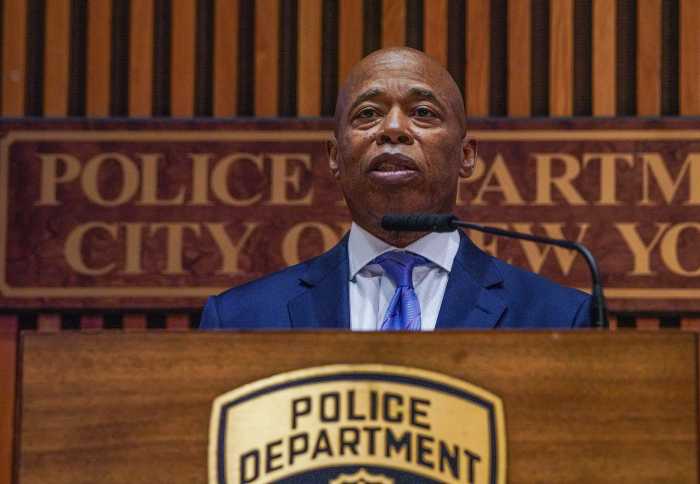Water Consolidation Plan seen favorable by state reps
(Editor’s Note: This is a continuation of the article “Adams Gives Cuomo Budget Presentation to Farmingdale” that appeared in the Friday, March 16 edition of the Farmingdale Observer.)
On Friday, March 2, the Farmingdale Public Library, Farmingdale Chamber of Commerce and Mayor George Starkie hosted a presentation of Governor Andrew Cuomo’s budget address, “New NY Transformation Plan…the Next Step,” given by State Cabinet Member Ken Adams, CEO of Empire State Development.
Cuomo and his cabinet members arranged a series of public sessions throughout the state to give residents a chance to get more information on the budget proposal. The state commissioners have been meeting with community members and residents to share details from the governor, as well as gathering concerns from residents to report back to Albany. Cuomo announced the initial budget proposal Jan. 17. The end of the state’s fiscal year is March 30.
While in Farmingdale, Adams heard from the Farmingdale school administration, Farmingdale Board of Education, the village government officials, the Farmingdale Public Library, and local business owners.
Farmingdale Schools Assistant Superintendent for Business Paul Defendini, explained that while only 4 percent of the school district’s budget is allocated to administrative salaries and compensation and benefits, the bulk of the budget is dedicated to employee salaries and benefits.
He explained how the 2 percent tax cap, without mandate relief, affects schools’ finances. About TRS (Teacher Retirement System), ERS (Employee Retirement System), and healthcare costs, Defendini told Adams the school districts especially need “meaningful mandate relief in those three areas.” He asked for this point to be shared with Albany.
Village of Farmingdale Mayor George Starkie said he recently attended a conference with Lt. Governor Robert Duffy about mandate relief at Molloy College in Rockville Centre.
Starkie shared concerns about statewide collective bargaining and its effects on the teaching evaluations, along with members of the Farmingdale School Board of Education. There are 700 school districts, statewide. He said the idea of having hundreds of individual plans for teacher evaluations across the state is unsettling. He hoped the state would figure out a way to apply collective bargaining model to the teacher evaluation program.
Starkie transitioned, saying, “Collective bargaining affects everyone, not just schools, but also municipalities.” He shared how in two separate times that he had to go into collective bargaining negotiations, what he was presented with were ideas from “something someone else got somewhere else.” He complained that it was hardly a fair starting point because others’ circumstances may have been very different from what happens in Farmingdale.
“The other thing we’ve been working on in the village for the past two years, is consolidation,” said Starkie. Farmingdale is investigating options for consolidating its water district with other neighboring districts.
Starkie explained, “The bullets and the fight that we’re taking on because of the parochial self-interests of groups, you would think that this is literally a no-brainer and yet we’re getting thrown under the bus.” The village’s look into the benefits show that merging water districts would reduce commercial and residential water rates significantly, Starkie shared.
Adams seemed very interested in finding support for the village’s water consolidation, even asking Starkie pointedly, “How can we [the state] help?”
The village is considering two options for water consolidation:
The first option is with Bethpage, which is part of Nassau County Water Authority. There are 56 water districts in Nassau County. The second option is to merge with Suffolk County Water Authority. Suffolk County has three water districts. If the village chose this option with Suffolk, Starkie said that the Village would need state-enabling legislation to be passed.
“Cha-ching, there’s where the politics start,” Starkie said.
The village presently has interconnects with both Nassau and Suffolk Water Authorities, but is having both options evaluated by an outside consultant.
Starkie told Adams, “For Suffolk County to cross the ‘Mason-Dixon line’, which happens to be the Route 110 corridor, you would need an act of God.” The Mayor feels there is a concerted effort by many Nassau County Water Districts to discourage Farmingdale from defecting.
Adams agrees with consolidation in general, “Consolidation really matters, and you want to start in the right place.” He suggested other service districts like sewage, lighting, libraries, look into the benefits of consolidation.
Adams gave a what-if analogy; if Farmingdale defects, then other water districts might consider their options. He said, “You have an unraveling of common sense for modernizing the economy,” suggesting that maybe government needs to undo itself a little to bring itself into the 21st century.
Farmingdale Library Director Debbie Podolski shared her concerns for how the budget affects libraries, especially in Farmingdale. She said it seems that the state remembers MTA tax, the aid, and payments that need to be paid, but she feels the state does not give fair consideration to the libraries, saying the libraries are in need of more aid.
The recent MTA repeal in December, capped payroll at $1.5 million. The Farmingdale Library’s payroll is at $1.6 million, second tier, which means they are still affected, and are required to pay .25 percent toward the tax.
Podolski said some issues the library systems are having could be resolved by more support from the state in consolidation. The systems serve as service centers for the dozens of public library member sites for cooperative purchasing. Podolski said the systems have been receiving cuts regularly, about 23 percent.
Adams asked what is preventing the library systems now from being able to support the kind of cooperating that the individual libraries would need. Podolski said, “They don’t have the staff.” She said the Nassau Library System is down to 10 people in staff. She suggested that buying through the schools’ cooperative purchasing plan could be helpful, but it is not an option to the libraries at this point.
“We do get a lot of support here, people love their library and they’d like to keep it local controlled because we offer what is important to Farmingdale residents,” said Podolski. She reminded that the libraries could definitely use more aid to maintain their programming.
Adams thanked the Farmingdale community, especially those in attendance for sharing their concerns. He ensured that the issues would be shared with lawmakers in Albany before the governor’s budget is passed.
Adams was confirmed by the legislature as Empire State Development (ESD) president, CEO and commissioner of the New York State Department of Economic Development in April last year. He works to promote economic practices that attract business and create jobs throughout New York. He also works closely with Lieutenant Governor Duffy to implement the Regional Economic Development Councils across the state.
The governor’s office has set up a website for residents to get regular information regarding the budget proposal and its effects, including a subscription option for regularly updated messages at: www.NYGetInvolved.com.
The Governor’s local offices are at: 303 W. Old Country Road in Hicksville; call (516) 317-4064. To contact Ken Adams, call (212) 803-3700 or send an email to president@esd.ny.gov.































